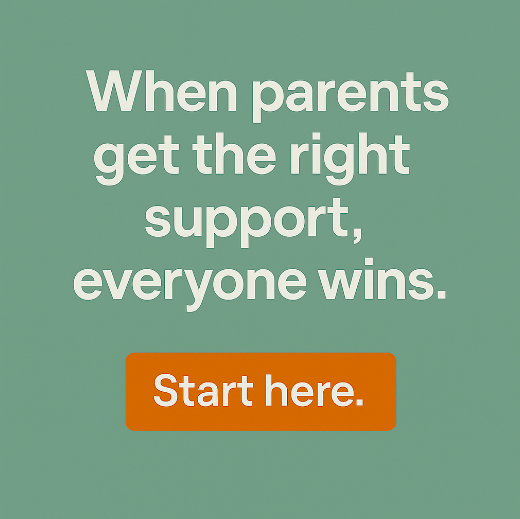7 Conversations Every Parent Should Start with Their Teen (So You’re Not Living, What I Can’t Undo)
“If the first time you're talking about mental health is mid-crisis, your battle just got infinitely harder”
Most parents don’t ignore their kids’ emotions. They just don’t always know how to reach them.
You see the withdrawal, the silence, the weight behind “I’m fine.” But how do you actually start the kind of conversations that get under the surface without pushing them further away?
By the time a crisis shows up, whether it’s failing grades, a panic attack, or something more serious, you’re not at the starting line. You’re already behind.
This is said to empower you.
Because the opportunity to connect? It’s already here. And it starts with one brave, sometimes awkward, often imperfect conversation at a time.
Here are 7 conversations every parent should start, not in the heat of the meltdown, but before, hopefully well before.
1. “How’s your heart doing lately?”
Not “How was school?” Not “Are you okay?” Try asking about their heart: not their grades, chores, or moods.
This question feels unexpected. Disarming. It signals: I care about you, not just your output.
Try this:
“No pressure to answer right away. But how’s your heart doing these days? Anything sitting heavy?”
2. “What’s something you wish adults understood about being your age?”
This one creates space for honesty, even if you don’t love the answers.
It invites your teen to teach you, which builds trust and emotional safety. You don’t have to fix anything. Just listen.
3. “What’s been feeling hard lately?” (Not ‘what’s wrong?’)
Instead of trying to diagnose a problem, ask about weight. Pressure. Friction.
Sometimes they won’t even know why things feel off until you ask in a way that sidesteps shame.
Try this:
“Is there anything that’s felt a little heavier than usual? Even if it doesn’t make total sense?”
4. “Have you ever felt like you needed help, but didn’t know how to ask?”
So many teens carry pain silently. They don’t want to burden you. They don’t want to be labelled.
This question normalizes their struggle without assuming there’s a crisis. It opens the door.
And if they say yes?
Tell them:
“You can always say that. Even if you don’t have the words. I’d rather know you need support than pretend everything’s fine.”
5. “How do you feel when things get really quiet at night?”
This one’s subtle. But it’s often when anxiety, loneliness, or overthinking creeps in.
Teens often distract their way through the day and collapse into big feelings after midnight. Nighttime is a time for many to unwind, relax and fall asleep in a blissful state. That is not every teen’s experience.
Try:
“Do you ever feel different at night, like things hit harder once everything slows down?”
6. “What would make it easier to talk to me when something’s wrong?”
This is about repair, not perfection. It says: I know I don’t always get it right. But I care enough to learn.
Let them tell you what shuts them down. And be ready to not defend yourself.
Say:
“It’s okay if you need to tell me something I’ve done that made it harder. I want us to figure this out together.”
7. “If you could have someone in your corner besides me, who would it be?”
This one stings a little. But it’s powerful. Because we want to be all things to our teen, but the truth is we can’t always be that person. And wouldn’t you rather know this in advance.
Sometimes teens don’t want to open up to a parent, because it feels too close, too scary.
Invite them to think about other safe adults: a mentor, a coach, a therapist, a family friend.
Let them know:
“It’s not about replacing me. It’s about having as many people in your corner as possible. You deserve that.”
Final Thoughts
The goal isn’t to prevent every hard moment. You can’t.
The goal is to build a bridge before the storm comes. So when the winds pick up, when school gets overwhelming, or friendships implode, or anxiety spikes, your teen knows exactly where to go.
I used to asked Maddie if I could just hang out without an agenda. Sometimes she’s talk, and sometimes we’d just hang in silence. That silence gave her safety and built up trust. Maybe she won’t open up today, but maybe someday. Your job isn’t to figure out her problems, it’s to create safety to speak when she was ready.
Start the conversation before the meltdown. You don’t have to say it perfectly. You just have to say something.
Because silence feels a lot like indifference. But connection? It starts with one sentence. One conversation. And that first conversation makes all the following conversations easier.
Calls to Action
Looking for more guidance? The question doesn’t sound like your teen? Go to our free parenting tool: TeenSpeak, at the bottom of our homepage.
We created a tool for parents like you, packed with real, compassionate advice for handling everything from eye-rolls to emotional shutdowns. Want to modify any of these questions to better suit your teen, give TeenSpeak some more information and TeenSpeak can modify the question to suit your teen’s personality, and comprise a response that hits a little gentler and makes them feel a little safer. Because that’s where the real conversations start.
If you’re an HR leader or team leader, who have employees with kids approaching their teen years, you will want to get ahead of this one. When a parent goes through struggles with their child, would'n’t you want to be there before the crisis. If you miss that window, you may see a considerable dropoff in productivity, absenteeism and presenteeism. Set up a educational session for your employees, to help to prepare them for the storm they’ll potentially be facing. Because if you don’t know what you’re looking for, how will you know when you see it.


